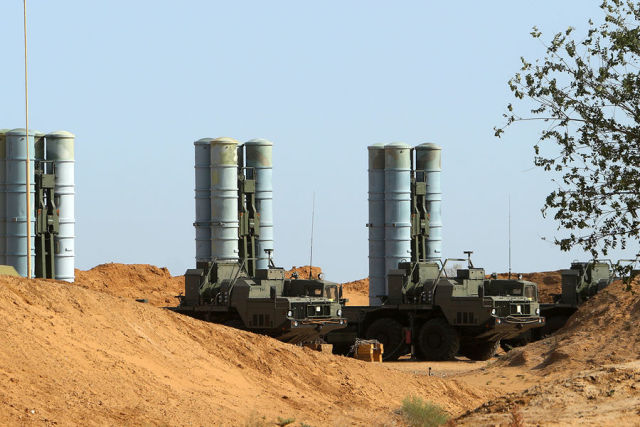In the United States, they said they had found a way to combat the S-400 Triumph complex
The United States approved the development of a new electronic warfare station (EW) AN / ALQ-249. This is a container that is suspended under the wing of a combat aircraft and creates noise at the frequency of the enemy's radar. It is reported that thanks to him, American aviation will be able to deceive Russian air defense systems. "Newspaper.Ru" figured out how the AN/ALQ-249 station would work and what its feature is.
The AN/ALQ-249 station is designed for EA-18G Growler carrier-based electronic warfare aircraft built on the basis of F-18 fighters. The main opponent of the system is called the Russian S-400 missile defense/air defense system and the Chinese HQ-9. At the same time, the newest S-500, whose serial production began on April 25, is not officially included in the list of opponents yet.
The station will be created in three versions: universal, low-frequency (to block long-range radar detection) and high-frequency (to counter fire control radar). All three versions will be able to exchange data with each other and work together.
"After the adoption of the AN/ALQ-249 station into service, the methods of conducting electronic warfare will completely change," the statement of the US Aviation Technical Command emphasizes.
Alexander Ermakov, an expert of the Russian Union for International Affairs (INF), believes that the creation of a new station is the next stage in the confrontation between air defense and electronic warfare systems. According to him, such stations deceive radars with false signals.
- noted Ermakov.
Such interference can not only confuse the ground radar, but also knock off course an anti-aircraft missile, the locator of which is smaller and simpler. "The radar in the missile's homing head is weak enough and works only on the final part of the flight," the expert explained.
In turn, Alexander Khramchikhin, deputy director of the Institute of Political and Military Analysis, pointed out that only old-style electronic warfare systems are suppressing the signal now. "Stupidly "pressing" the locator now, most often, is useless - it will either go to another frequency, or it will have more power," Khramchikhin stressed.
Alexander Ermakov added that it is too early to evaluate the effectiveness of AN/ALQ-249 against Russian and Chinese complexes, since all the algorithms of its operation were laid hypothetically.
"Even the creators themselves cannot be completely sure that the algorithms will be effective. This is a correspondence opposition, because no one has tried one against the other," the expert said.
According to him, no electronic warfare system can guarantee protection from air defense systems, but it will become more difficult to detect and shoot down targets with their introduction. In addition, Russian and Chinese air defense systems are constantly being improved, and as soon as the characteristics and operating principle of the new jamming station become known, the software of these complexes will be updated.
The American media claims that the AN/ALQ-249 will be able to use the algorithms of the S-400, since Turkey has such complexes and is considering the possibility of transferring the work schemes to the Americans.
- noted in the article Military Watch Magazine
Russian experts are skeptical about this possibility.
So, Alexander Ermakov stressed that the S-400 complexes that Russia supplied to Turkey will not be able to "teach" the new electronic warfare system to fight Russian air defenses if Ankara shares data on their work with Washington.
"Other systems are exported. They work in a similar way, the missiles there are very similar, there are few differences in terms of hardware, but the algorithms are completely different. In addition, we understood that we had delivered the complex to a NATO country. Therefore, the Turkish S-400 will not help to train this system," Ermakov believes.
Alexander Khramchikhin added that in addition to the reduced functions, the Turkish S-400 may have protection from studying the algorithms of operation. "There are, most likely, other algorithms, and it is quite possible that it is impossible to "get into" there at all - if you try to interfere, everything can be reset there," Khramchikhin explained.
Denis Telmanov

